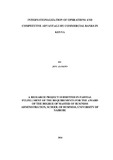| dc.description.abstract | There has been an increase in the number of companies that have been operating outside their home countries. This has allowed them to gain attributes that banks in home countries only cannot acquire, giving most of them a certain competitive advantage. Kenyan banks following that trend have extended their operations to other countries in East Africa and this study determines whether that internationalization positively impacts their competitive advantage. The study which was a cross-sectional descriptive survey was done using 5 banks, namely, Equity, Kenya Commercial Bank ltd, Investment and Mortgage Bank ltd, the Cooperative Bank of Kenya ltd and the National Industrial Credit Bank ltd. This study found that KCB has internationalized more its operations with presence in 6 countries, having over 10 foreign branches, 10%-15% of foreign profit. It is followed by Equity with presence in 5 host countries, over 10 foreign branches and 10-15% of foreign profit. NIC is in 3 host countries, has 7 foreign branches and under 5% foreign profit. Lastly there was Cooperative bank which is in 2 host countries, has 4 foreign branches and under 5% of foreign profit. Using the Likert scale to analyze the data, it was found that the banks that have internationalized their operations the most, KCB and Equity Bank, have gained the most competitive advantage and the bank that have internationalized less like the Cooperative Bank of Kenya get the least competitive advantage from their internationalization. This was reflected in the other banks results as the more there was internationalization, the more there was competitive advantage. This implies a positive relationship between the extent of internationalization and the level of competitive advantage. A correlation analysis between the rank of banks according to their extent of internationalization and the rank of the banks according to the percentage of important advantages gained reveals a strong correlation. This means that the level of internationalization is important in gaining a better competitive advantage. It was also found that Cost leadership was the least advantage gained through internationalization while differentiation was the main. Internationalization is advantageous if the banks desire to gain competitive advantage through differentiation. | en_US |



